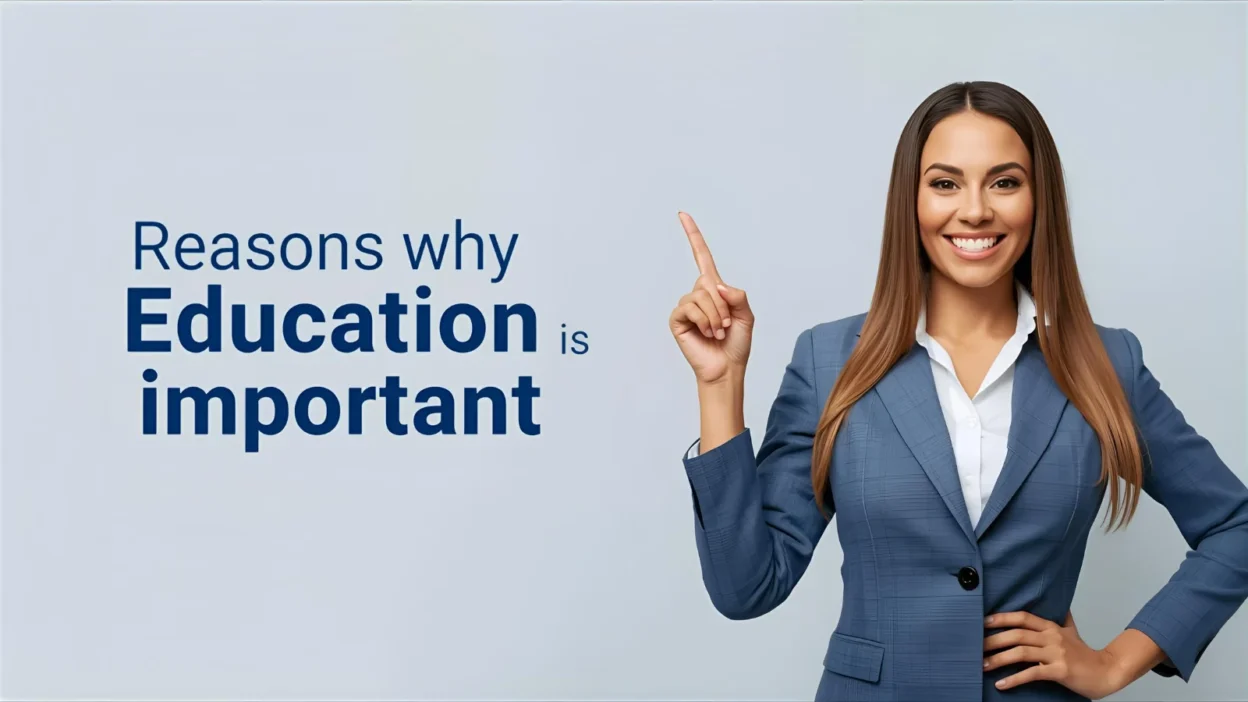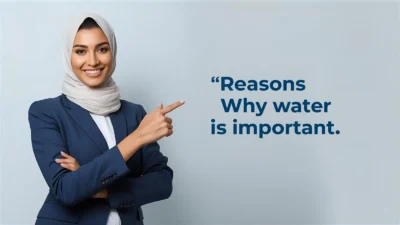Education isn’t just about books or classrooms — it’s the foundation of life, the key to success, and the bridge between ignorance and knowledge. It shapes minds, builds character, and opens the doors to countless opportunities.
From learning how to read and write to understanding science, ethics, and culture, education empowers individuals and societies to progress, adapt, and grow.
Let’s explore the 43 strong reasons why education is important, not just for career success, but for personal growth and a better world. 🌍
1. Education Empowers Individuals
Education gives people the knowledge and confidence to make decisions, solve problems, and shape their own futures.
It teaches independence — helping individuals think for themselves rather than rely on others.
💡 Example: A girl in a rural village who receives basic education can manage finances, run a business, or advocate for her rights.
💬 Quote: “Education is the most powerful weapon which you can use to change the world.” — Nelson Mandela
2. Education Builds Critical Thinking
Through learning, people develop the ability to analyze, question, and reason.
This helps them make informed choices and challenge misinformation.
🧠 Example: A well-educated person won’t blindly follow rumors — they’ll verify facts first.
🎯 Takeaway: Education doesn’t tell you what to think; it teaches you how to think.
3. Education Opens the Door to Opportunities
Education broadens horizons — it increases access to better jobs, higher income, and improved living conditions.
It also enables people to explore new careers and passions.
💼 Example: A university degree can help someone qualify for professional fields like medicine, engineering, or law.
📈 Fact: Studies show that every extra year of schooling increases income potential by up to 10%.
4. Education Reduces Poverty
Education helps break the cycle of poverty by giving people skills to earn stable incomes and improve their families’ lives.
🌍 Example: UNESCO reports that if all adults completed secondary education, 420 million people could be lifted out of poverty.
💬 Quote: “Give a man a fish and you feed him for a day. Teach him to fish and you feed him for a lifetime.”
5. Education Promotes Gender Equality
When girls receive equal educational opportunities, societies become more balanced and fair.
Educated women are more likely to participate in the workforce, make informed health choices, and educate their children.
👩🏫 Example: In countries where girls stay in school longer, early marriage and child mortality rates drop dramatically.
6. Education Strengthens Communities
An educated population leads to safer, more cooperative, and more productive communities.
People become more aware of their responsibilities and are better equipped to help one another.
🏘️ Example: Communities with high literacy rates have lower crime rates and higher civic participation.
7. Education Encourages Innovation and Progress
Education fuels creativity and innovation — it’s the driving force behind scientific discoveries, technology, and cultural growth.
🚀 Example: Every breakthrough — from the internet to renewable energy — began with educated thinkers asking “what if?”
💬 Quote: “Innovation is born where knowledge meets imagination.”
8. Education Promotes Good Health
Educated people understand hygiene, nutrition, and healthcare better.
They make informed lifestyle choices, reducing disease and improving longevity.
💊 Example: Mothers with formal education are more likely to vaccinate their children and seek medical care when needed.
9. Education Builds Moral and Ethical Values
Beyond academics, education teaches right from wrong, empathy, and respect for others.
It shapes character and helps build a society rooted in justice and compassion.
🕊️ Example: Schools that teach ethics and social responsibility produce more tolerant and law-abiding citizens.
10. Education Enhances Communication Skills
Reading, writing, and speaking effectively are all outcomes of quality education.
Good communication opens doors in careers, relationships, and leadership.
🗣️ Example: A student who learns public speaking can later use that skill in interviews, meetings, or advocacy.
💬 Idioms to Remember:
- “Break the ice” — to start a conversation.
- “Speak your mind” — to express your thoughts honestly.
11. Education Encourages Global Awareness
Through education, we learn about cultures, histories, and global challenges.
This understanding promotes peace, tolerance, and cooperation among nations.
🌐 Example: Learning about climate change or world history helps individuals think globally and act responsibly.
12. Education Builds Confidence and Self-Esteem
Knowledge gives people the power to believe in themselves.
It boosts confidence and helps them overcome fear, uncertainty, or social barriers.
💪 Example: A student presenting in class develops the courage to speak in public later in life.
💬 Quote: “Confidence comes not from always being right, but from not fearing to be wrong.”
13. Education Supports Sustainable Development
Education encourages people to care for the planet — teaching about environmental conservation, sustainability, and ethical consumption.
🌱 Example: Environmental education helps communities plant trees, reduce waste, and use renewable energy.
📘 Fact: The United Nations identifies education as a key pillar of Sustainable Development Goals (SDGs).
14. Education Prepares People for Change
The world is constantly evolving — with new technologies, jobs, and challenges.
Education helps people adapt, learn new skills, and thrive in a changing environment.
🔄 Example: Workers who learn digital skills can stay competitive in the modern job market.
15. Education Shapes Future Leaders
Every great leader — from scientists to politicians to activists — began with education.
It teaches vision, discipline, and the ability to make informed decisions for the greater good.
🌟 Example: Leaders like Malala Yousafzai and Barack Obama used education to inspire change worldwide.
💬 Quote: “Leadership and learning are indispensable to each other.” — John F. Kennedy
📚 Common Idioms and Expressions About Learning
| Idiom / Expression | Meaning | Example |
|---|---|---|
| “Knowledge is power” | Learning gives strength and freedom | Education proves that knowledge is power. |
| “Hit the books” | Study hard | Students need to hit the books before exams. |
| “Learn the ropes” | Understand the basics | It takes time to learn the ropes in any job. |
| “Go back to the drawing board” | Start again | If a plan fails, go back to the drawing board. |
| “Old school” | Traditional | Some teachers still use old school teaching methods. |
💬 Synonyms and Related Words for Education
| Word / Phrase | Meaning | Example |
|---|---|---|
| Learning | Process of acquiring knowledge | Lifelong learning keeps the mind sharp. |
| Instruction | Formal teaching | Good instruction shapes a student’s potential. |
| Training | Practical skill development | Vocational training builds job readiness. |
| Schooling | Period of formal education | His schooling prepared him for college. |
| Literacy | Ability to read and write | Literacy opens the door to new opportunities. |
✍️ Grammar Tip: Using “Education” Correctly
| Form | Example Sentence |
|---|---|
| Noun | Education shapes the foundation of society. |
| Adjective | Educational programs help students learn new skills. |
| Verb (related) | To educate others is to empower them. |
✅ Correct: Education is essential for human progress.
❌ Incorrect: Educations are important for everyone. (It’s uncountable.)
🌍 Real-Life Example: The Power of Education — Malala’s Story
Malala Yousafzai, a Pakistani activist, risked her life to fight for girls’ education.
Her courage showed the world that education is not a privilege — it’s a right.
Her journey inspired millions and earned her the Nobel Peace Prize, proving how education transforms individuals and societies.
🌱 How to Promote Education for All
- Support free and inclusive schooling for children.
- Donate books or supplies to local schools.
- Volunteer to teach or mentor.
- Advocate for government education reforms.
- Promote digital learning and literacy.
💬 Small actions can create a world where everyone has the right to learn.
❓ FAQs About Education
Q1: Why is education called the key to success?
Because it opens doors to opportunities, builds confidence, and improves quality of life.
Q2: Can education reduce poverty?
Yes — educated individuals earn better incomes and create jobs for others.
Q3: Why is moral education important?
It builds ethics, empathy, and social responsibility.
Q4: Is education only about school learning?
No — true education includes life skills, experiences, and self-learning.
Q5: How does education benefit society?
It promotes peace, innovation, equality, and sustainable growth.
🎯 Conclusion
Education is more than a path to a job — it’s the light that guides humanity.
It breaks barriers, nurtures talent, and helps people live with dignity and purpose.
🌟 “An investment in knowledge pays the best interest.” — Benjamin Franklin
The more we value education, the brighter our collective future becomes.
Because in the end, education doesn’t just build careers — it builds better humans.

Sara Taylor is a content writer at Whygenix.com, creating clear, engaging articles that simplify complex ideas, helping readers understand the why behind topics in education, lifestyle, and personal development.




